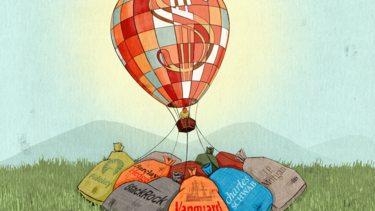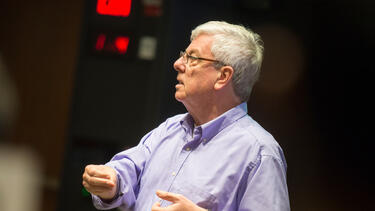Competition
The Top Ten AI Competitors
The mammoth investments pouring into artificial intelligence companies are remaking the high-tech industry. Former SOM Dean Ted Snyder and investor Logan Bender ’19 assess which leading companies are likely to keep their advantage and which could be crushed by the rolling wave of innovation.

The Rise of the Mutual Fund Is Reducing Corporate Competition and Hurting Consumers
Mutual funds have become large shareholders in most public U.S. firms. The resulting overlaps in ownership are boosting corporate profits but harming consumers, according to a new study co-authored by Florian Ederer of Yale SOM.

Will the EU’s New Law Remake Big Tech?
We asked Prof. Fiona Scott Morton, an expert on antitrust policy, what the Digital Markets Act will mean for users in Europe and elsewhere.

A Better Way to Divide the Pie
In his new book, Prof. Barry Nalebuff proposes a fairer, more principled way to negotiate: splitting the additional value created by reaching an agreement. In this excerpt, he explains the concept through a visit to one of New Haven’s iconic pizza spots.

Beyond Resolutions: Research-Based Suggestions for 2022
We asked faculty from the Yale School of Management for their advice—philosophical, professional, and personal—for our readers for the coming year.

GE’s Split Unravels a Massive Management Mistake
General Electric CEO Larry Culp announced this week that the company would split into three separate firms. Prof. Jeffrey Sonnenfeld writes that Culp was acknowledging the failure of an approach—the highly diversified industrial conglomerate—that dates back to Jack Welch’s tenure in the 1980s.

Exploring Alternative Futures
Professor Paul Bracken has spent a lifetime studying the complex systems like international business, technology, and the military. A pioneer of scenario planning, he looks at how organizations really work and how they both drive and are shaped by major trends in order to predict possible futures.

What Went Wrong in Afghanistan?
We asked Prof. Paul Bracken, an expert in business and military strategy, how the U.S. could have avoided a chaotic exit from Afghanistan, and what comes next for the region.

Does Big Tech Gobble Up Competitors?
An executive order from President Joe Biden last month and a congressional report in October accused large technology firms of engaging in “killer acquisitions,” citing research by Yale SOM’s Florian Ederer.

Can Congress Create Real Competition for Big Tech?
Last week, members of Congress from both parties introduced a series of bills to curtail the dominance of the major technology firms. We asked Prof. Fiona Scott Morton if the proposed legislation would help level the playing field.

Social Media Is Addictive. Do Regulators Need to Step In?
Yale SOM’s Fiona Scott Morton and her co-authors argue that smarter and more robust antitrust enforcement can help, by making room for new social media platforms that promote themselves as healthier alternatives.
